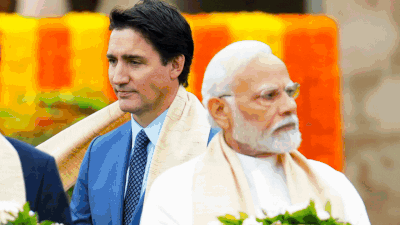Canada Accuses India of Assassinating Alleged Khalistani Terrorist Hardeep Nijjar: Unraveling the Controversy

Canada Accuses India of Assassinating Alleged Khalistani Terrorist Hardeep Nijjar: Unraveling the Controversy
In a stunning turn of events that has garnered international attention, Canada has accused India of orchestrating the assassination of Hardeep Singh Nijjar, a man alleged to be a Khalistani terrorist with a turbulent history. The incident has sparked debates and raised questions about extradition, international diplomacy, and the implications of such a grave accusation.
The Mysterious Life of Hardeep Singh Nijjar
Hardeep Singh Nijjar, originally hailing from Punjab, India, relocated to Canada in 1997. His presence in Canada drew significant scrutiny from Indian authorities, who accused him of leading the Khalistan Tiger Force, a separatist organization advocating for the establishment of an independent Sikh state called Khalistan. This group, considered a terrorist organization by India, has been linked to various acts of violence in the past.
One of the most significant allegations against Nijjar dates back to the 2007 Ludhiana blast case, which resulted in the tragic death of six individuals. Indian authorities have long sought Nijjar for his alleged involvement in this heinous act. The incident left a scar on the collective memory of the region, and justice for the victims has remained a pressing concern.
India’s Terrorist Designation and Reward Announcement
In 2020, the Indian government officially declared Hardeep Singh Nijjar a terrorist, intensifying the efforts to bring him to justice. This designation further strained the already complicated relationship between India and Canada over Nijjar’s presence on Canadian soil.
The tension escalated further in July 2022 when India’s National Investigation Agency (NIA) announced a substantial ₹10 lakh reward for information leading to Nijjar’s capture. The offer underscored the Indian government’s unwavering commitment to apprehending him and putting him on trial for his alleged involvement in the Ludhiana blast and other related activities.

The Accusation that Rocked Diplomatic Relations
The controversy surrounding Hardeep Singh Nijjar took a dramatic twist when Canada accused India of being behind his assassination. The Canadian government’s assertion sent shockwaves through the diplomatic community, raising numerous questions about the nature of the relationship between the two nations and the circumstances surrounding Nijjar’s death.
Canadian authorities have claimed that Nijjar was killed on Canadian soil, and they hold India responsible for his death. This allegation has given rise to a complex web of accusations, counter-accusations, and demands for a thorough investigation into the incident.
The Diplomatic Dilemma: Extradition or Elimination?
One of the central issues at the heart of this controversy is the question of whether India indeed orchestrated Nijjar’s assassination on foreign soil. If proven true, this would represent a serious violation of international law and diplomatic norms. However, if Nijjar was indeed a terrorist with a bloody past, questions arise about the ethics and legality of harboring such individuals on Canadian soil.
Canada’s extradition laws are stringent, and extradition requests can take years to process, often leading to diplomatic tensions between countries. India’s efforts to bring Nijjar to justice have faced significant obstacles in the Canadian legal system, further straining bilateral relations.

The International Response
The accusation made by Canada against India has reverberated on the international stage, prompting calls for an impartial investigation to determine the truth. Both nations have faced mounting pressure from the international community to address this controversy transparently and responsibly.
The United Nations has expressed concerns about the incident, emphasizing the need for a comprehensive investigation to ascertain the facts surrounding Nijjar’s death. Such an investigation, if conducted independently and fairly, could help shed light on whether India did, in fact, play a role in the alleged assassination.
The Ripple Effect on the Sikh Diaspora
The controversy surrounding Hardeep Singh Nijjar has had a significant impact on the Sikh diaspora, particularly those living in Canada. The Sikh community in Canada is one of the largest outside of India, and the Nijjar case has heightened tensions within the community.
While some members of the Sikh diaspora continue to advocate for Nijjar’s cause, claiming that he was a political activist rather than a terrorist, others have distanced themselves from his alleged actions and expressed concerns about the impact of this controversy on the broader Sikh community in Canada.
The Quest for Truth and Justice
In the midst of this diplomatic storm, there is a growing consensus that a thorough, independent investigation is the only way to establish the truth surrounding Hardeep Singh Nijjar’s death. Both Canada and India must work together to ensure that justice is served and that the rule of law prevails.
The international community will be closely watching as developments unfold in this case. The outcome will undoubtedly have far-reaching implications for extradition procedures, diplomatic relations, and the fight against terrorism worldwide.
Conclusion: A Controversy that Demands Answers
The accusation that India orchestrated the assassination of alleged Khalistani terrorist Hardeep Singh Nijjar on Canadian soil has ignited a firestorm of controversy with implications that extend far beyond the borders of these two nations. As the world waits for a thorough investigation to uncover the truth, the Nijjar case serves as a stark reminder of the complexities surrounding extradition, diplomatic relations, and the pursuit of justice in an interconnected global society.
The international community remains hopeful that a resolution to this dispute will emerge, one that upholds the principles of justice, transparency, and the rule of law, while also addressing the legitimate concerns of both Canada and India. The fate of Hardeep Singh Nijjar and the implications of this case will continue to captivate the attention of the world, serving as a powerful reminder of the challenges faced in the fight against terrorism and the quest for justice on the international stage.




